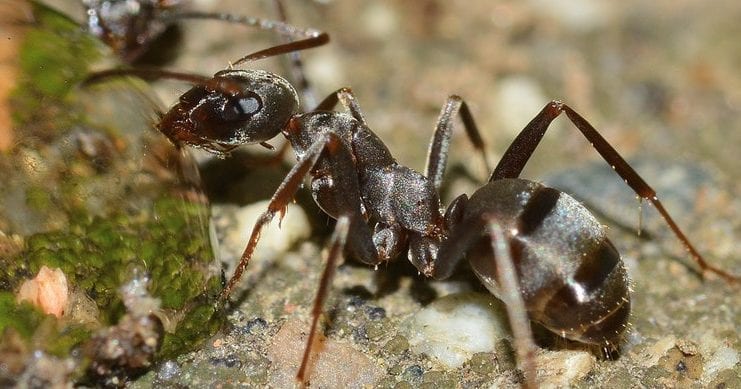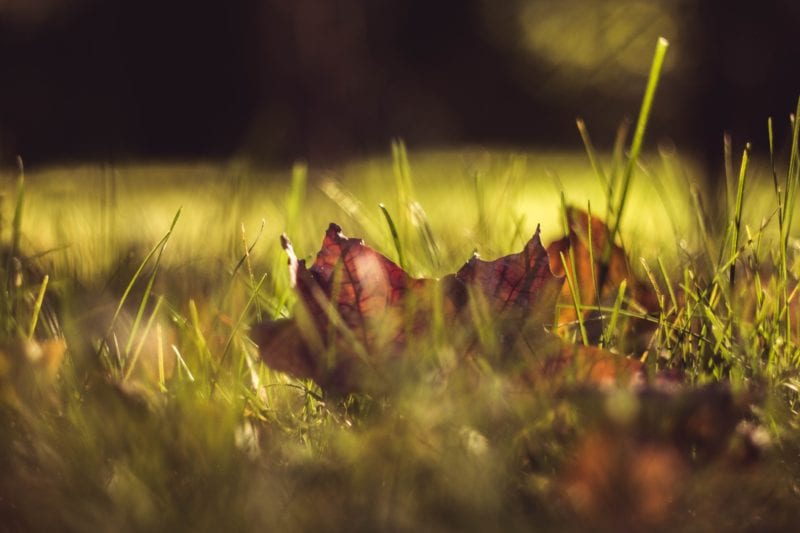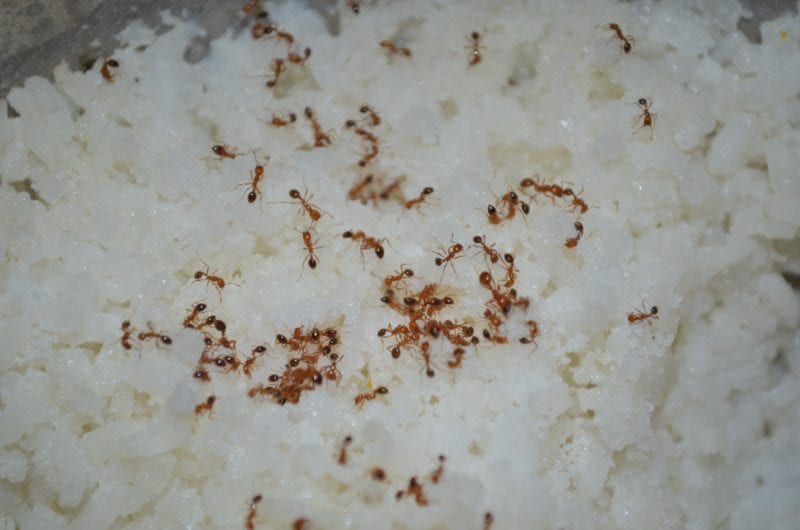
Ants are actually quite interesting and hardly dangerous animals. They can even be quite useful in the garden. However, no one wants to have ants in the house. So the ants in the house can provide for any amount of dirt and even cause a real damage.
But how do the ants actually get into the house and how do you get rid of them?
In this article, I provide you with the solution if you are struggling with ants in the house.
Contents
- 1 The causes of ants in the house
- 2 Damage caused by ants
- 3 Where do the ants come from
- 4 Flying ants in the house
- 5 Small ants in the house
- 6 Fighting ants in the house
- 7 Home remedies against ants in the house
- 8 The baking soda bait
- 9 Redirect the ant trail
- 10 Relocate ants
- 11 Flood the ants
- 12 Drive away the ants with smells
- 13 Author
The causes of ants in the house

There are many different types of ants. You can distinguish them well even as a layman by their different size. If they are very small ants, they will be only way ants. They will rarely settle in your house, but will only be passing through. Nevertheless, even these small ants can cause damage to your pantry and attack the food.
If the small ants get too comfortable there, it can happen that it is very difficult to get rid of them. Therefore, you should fight even small ants as soon as possible.
However, there are also much larger types of ants. If they are between 6 and 18 mm in size, they are horse ants. These are also called termite-like ants and in the wild they feed on the sweet secretion of aphids. However, when they are in your house, they prefer to eat sweets and other sugary foods. In doing so, they are not exactly squeamish and can cause considerable damage.
That ants deliberately leave their nest in the wild, and then move into the house is rather unusual. Rather, ants get lost in their search for food sources and may even end up in your house.
If the ants then find easy food sources, they are of course interested in developing these food sources. Quickly, other ants are called in, which then also move along the ant trail to the food sources.
So to prevent ants in the house, you should not have any open food in the house. It does not matter if the food is on the first floor or on a higher floor. Ants find their way almost everywhere and, once they have discovered something of interest, they will also make their way to higher floors.
Top care should be taken with sugary foods in particular. So never leave soft drinks or other sweet foods sitting around in plain sight.
Damage caused by ants
Ants are generally considered rather harmless animals. They are rather rarely known for major damage and what harm can such a small ant do?
But the effects of an ant infestation can be devastating. They can transmit bacteria and generally worsen the hygienic condition of your home.
It also becomes dangerous when ants are near electrical appliances. If they get into electrical appliances, they can cause a cable fire. This results not only in a damaged electrical appliance, but the fire can spread to the entire house. These cases are rare, but they can happen.
For humans, ants can also be unpleasant. The bites are not very painful, but they can cause minor skin irritations. It becomes dangerous, however, if you are allergic to ants. This allergy may well occur and in the case of an ant bite, allergic shock may be the result.
Where do the ants come from

Ants have their natural habitat outside the house. The ants’ nests will either be in the garden, or under loose stone slabs, or rotten wood.
The ants are more flexible than often assumed and can find their way even in very narrow crevices of the house. However, it is not the case that ants build nests in the house.
Rather, the ants you encounter in the house are resident outside the house. If the ants have come across a useful source while searching for food, for example your pantry, then an ant trail to that food source will develop shortly thereafter.
Ants are also very small animals that can get through almost anywhere. Closed doors are not an obstacle for them, and even leaky windows are a favorite access point for the ants. Even through very fine cracks in the masonry, the ants can find an entrance.
Flying ants in the house
In some cases, however, you may discover ants in the house that have wings. This is not a separate species of ants, but they are sexually mature males and females that are on a nuptial flight.
The goal of this nuptial flight is to find a sexually mature mate and in this search the ants also like to get lost in a house. The winged ants appear around May, until late midsummer.
However, the winged ants meet a hard fate. While the male ants die, the female ants lose their wings and become sedentary.
The flying ants are attracted to open food just like the common ants. The scents of the food are responsible for attracting the flying ants.
Light can also attract flying ants. Therefore, in the summer, you should either keep the windows closed in the evening or try to keep the flying ants from entering the house with a fly screen.
Small ants in the house

Most species of ants will certainly not be happy in your house and are just passing through to grab the food sources. However, it is different with the brown path ant and it can also build your nests inside the house.
So, if you discover small path ants with a size of about 2 to 4mm, then you should take serious measures. To fight these ants in the house it is not useful only to block the ant trail. Often, you will not even see an ant trail, but the ants will walk through your house sporadically.
Killing the ants is also not useful. Each ant that is killed can be replaced again by the queen. Thus, the ant population remains constant and fighting the workers is not very effective.
So, to get rid of the ants in the house, you need to get to the core of the cause. To do this, you need to find the nest and the queen. Once the source has been identified, the only way to help is to fight them with insecticide.
Ant poison can help to eliminate the ant colony. To do this, you can apply ant bait in the house and fight them.
For control should always consult a pest controller. After all, the small ants can stay in the most crooked corners and create a widely ramified nest. To combat this completely, specialized personnel is necessary.
Fighting ants in the house
However, if you do not have a brown ant in your house, but other ants that are in the house, but have not created a nest there, then you can also resort to gentler methods to make it clear to the ants that your house is not shared with the ants.
Basically, you have the option of either resorting to home remedies for ants or you can use chemical remedies. Moreover, the ants can be fought similarly to the ants in the garden.
In general, however, it is recommended to avoid chemical means or strong insecticides in the house. If these are still applicable in the garden without problems, the higher concentration and closer contact with the agent can lead to adverse health effects.
Although these agents rarely pose a danger to humans, prolonged contact can still cause irritation. If you have small children in the house or pets, then you should avoid the insecticides altogether. The insecticides represent here a higher load for the organism.
Home remedies against ants in the house
If the ants have formed an ant trail, then you can use natural food baits to keep the ants from continuing to use the ant trail. The goal here is not to exterminate the ants, but to signal a potential danger. The ants are so intelligent that they will stay away from this place.
The baking soda bait
To keep the ants from entering your home you can use baking soda. The baking soda is deadly to the ants and, if you place a baking soda bait near your food, the ants will avoid that place.
To do this, make a mixture of baking soda and something sweet. Either commercial sugar or honey is suitable for this. Mix the baking soda and the sweet food well and then place it near the food source. Once the first ants have snacked on it, the other ants will avoid that location.
Redirect the ant trail
However, the ants can also be kept away from the food in a much gentler way. Namely, ants don’t like chalk and chalk is a natural blockade for them.
You can take advantage of this and interrupt the ant trail with chalk. The ants will then look for another way and will not cross the chalk. Of course, it is especially effective if you block the entrances to the house with the chalk. In this way, you can directly prevent the ants from having access to the house. If you do not trust the natural chalk alone, then you can also try chalk, which is specifically helpful against insects.
Relocate ants
If the ants have made themselves comfortable close to the house, relocating them can help to keep them away from the house. However, this is only an option if the nest and the queen have been clearly found.
To do this, you can take a flower pot and fill it with wood wool. Now place the flower pot upside down on the nest and wait until the ant colony has moved into the flower pot. Now you can easily move the entire colony to another place.
Flood the ants
However, if the ants are already in a flower pot, but you don’t belong there at all, then you can also drive the ants away by flooding the flower pot several times.
This will not kill the ants directly, but you will notice that you are unwanted there. As a result, they will look for a new home. Of course, it is better if you have the opportunity to place the flower pot somewhere else for a while and wait for the ants to relocate. After all, if the flower pot is on the balcony and the ants have little chance to find a more suitable place, then you are only shifting the problem.
Drive away the ants with smells
Ants have a very sensitive sense of smell. Therefore, smells can also help to block your way. Since the ant trail is actually a scent trail that all ants follow you can not only block the way, but also dissolve the ant trail directly.
Of course, plants with essential oils are best suited here. These include, for example: thyme, juniper leaves, lemon herb or lavender leaves.
These are placed along the ant trail and food sources, and the ants will look elsewhere for food, disoriented.
In addition, the home remedies lemon peel or vinegar have proven their worth.

